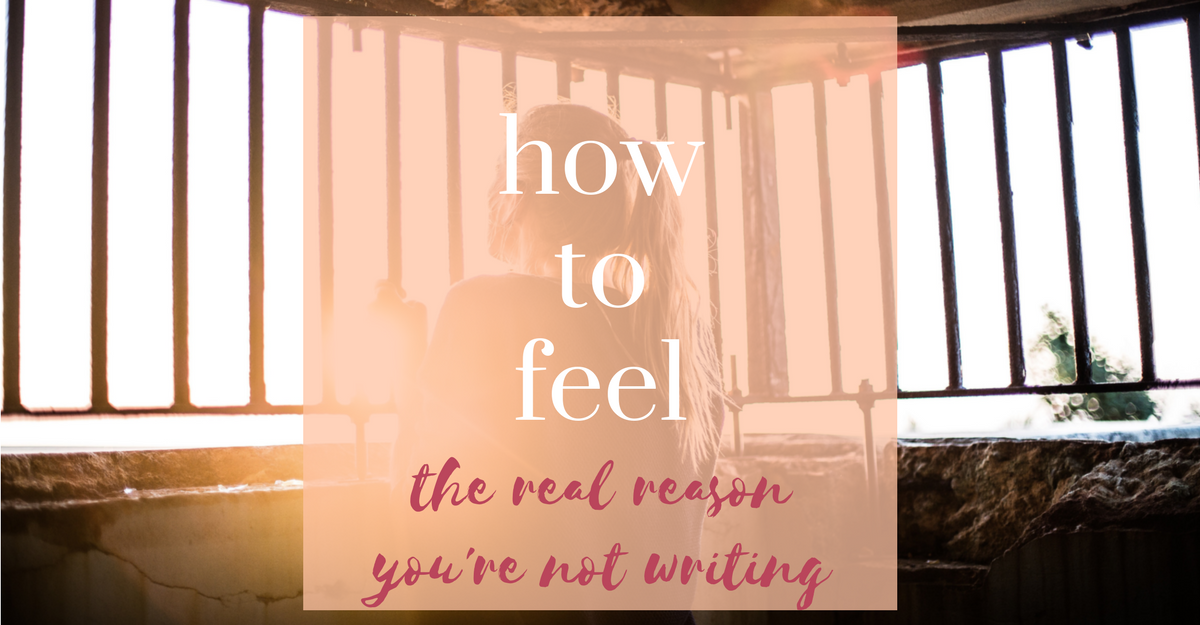Perfectionism and Writer’s Block
/My novel isn’t written yet.
I planned to finish it ages ago. Like any good former Catholic schoolgirl, I followed all of the best getting-stuff-done advice:
- Set daily goals for my word count.
- Gave myself firm deadlines.
- Asked friends to keep me accountable.
- Hired a life coach.
- Made spreadsheets, for goodness sake.
Something wasn’t working, though. Those deadlines came and went. I told myself I didn’t have enough free time, so last September I quit my job, hoping that the additional time and energy—not to mention the making-a-living sword dangling over my head—would spark brilliant sentences from my fingertips.
I even did visualizations, indulging in elaborate daydreams of typing “The End,” uncorking champagne, and receiving congratulatory hugs from friends and family and my agent. (No, I don’t have an agent, but it was my visualization, so I made it damn good.)
Well, none of that worked. Sixteen months after starting my novel, I’ve drafted about 55,000 words. Some of those words are good, some of them are dreadful, and I’ve been stuck around the 50,000-word mark for way longer than I’d care to admit.
So what happened? Well, my dad got sick and died, and my fiancé and I canceled our wedding, and then the first anniversary of my dad’s death came around and all I wanted to do was lie on the shaggy white rug next to my bed. Some writers might thrive on chaos and pain and grief, but I sure as heck don’t. Not one of these things was remotely good for my productivity.
But really, there’s only one person to blame for my writer’s block: me. I. Laura Romain, with the deep-set eyes and the crooked smile.
I’ve known for ages what my issue is. Professors have told me; therapists have told me. I’m surprised that the magic 8 ball I shook as a kid didn’t tell me.
I’m a perfectionist.
My expectations are high. Damn high. I want to be good, and I want to be good now. Writing a bad sentence feels like a million tiny bugs shredding off pieces of my skin. Negative feedback makes me want to flop down on the aforementioned shaggy rug. And failing to make any progress at all—structuring my days so I vacuum my apartment rather than sit at a keyboard, so I go to Pilates rather than confront the expectant blink of a cursor—feels like that scene in Lethal Weapon 2 where the bad guys tie up Mel Gibson and throw him in the ocean.
But that lack of productivity also feels inevitable. Because there’s a nasty voice in the back of my head that asks: How can I sit down to write when my life isn’t in order? When dishes sit in the sink and my inbox overflows with flagged messages? When there are more clothes than hangers in my closet? When I haven’t found a life partner yet?
And—most insidious of all—how can I sit down to write when I’m not sure anything good will come out?
I used to roll my eyes when people told me I was a perfectionist. Here was my logic: How can I be a perfectionist when I’m a piece of shit? When I have papers strewn all over my room and I’ve written exactly zero words today and my hair is all flat in the back? When I still haven’t gotten my damn passport photo taken?
This mean old logic only got stronger after I quit my job. If you want to feel really and truly terrible about yourself, quit your job to do something and then don’t do it.
Sure, I wrote a bit. But I was thrown by all of the changes in my life and dragged down by the deadweight of my own expectations, and the words I wrote weren’t great. It was just one of those spells. I got lukewarm feedback from my writers’ group, and some downright negative feedback from the woman who taught a nonfiction class I took.
The feedback was valid and useful and all that, but I’m horrifically sensitive to anything short of glowing praise (not good, I know), so I shut down. I vacuumed. I went to Pilates.
“I’ll pick up again after the anniversary of my dad’s death,” I told myself, “or once the new year rolls around.” But—surprise, surprise—arbitrary dates haven’t magically fixed anything. I didn’t leap out of bed on January 1st and, in my eagerness to open my laptop, accidentally break it in half.
So here I am, still working up my courage (or, as I like to say, “screwing my courage to the sticking place”) so I can face my neglected characters and my screwy scenes. And you know what? I don’t need any productivity hacks or mission statements. I don’t need a resolution, a glass of wine, or yet another how-to book.
I need to deal with my fear of writing something crappy.
Sure, this post might be more popular if I titled it “5 weird tips for beating writer’s block, vanquishing perfectionism, and writing a novel so good it grows a unicorn horn.” But I’m calling it “Perfectionism and Writer’s Block” for a reason: because those two things go together.
Here’s my theory: without perfectionism, there is no writer’s block. If you don’t care about proving you’re a good person or a creative soul or an eighteen-karat genius through your writing, then pushing out words is easy. But if you need your work to be good—to prove that you’re a worthwhile person or that you’re not wasting your life or that it’s OK that you gained five pounds last year—then it’s going to hurt like hell.
I’m reading a book by Pavel Somov right now. His argument is that everything as it stands at this moment is absolutely perfect. Here’s the logic:
- You can change the future, but not the present moment.
- If the present moment can’t be changed, then it can’t be improved.
- If the present moment is beyond improvement, then it’s perfect.
I’m not a logician, so I can’t tell how flaky this line of reasoning is, but I want to believe it. In my life, a little acceptance could go a long way.
Last night, I lay awake, wrestling with the idea that the present moment is perfect. “It can’t be,” I thought, “because then my horrific writer’s block would be perfect. And my writer’s block can’t be perfect, because there is no freaking point in it.”
But maybe there is a point. Maybe the point of these dry weeks (OK, months) was to make me write this blog post. Maybe the point was to force me to finally grab my perfectionism by the claws. Maybe the point was to prevent me from setting down too many words during a time when my heart was small and cramped.
Sure, when we face blocks, we can attack them with spreadsheets, word-count goals, and productivity trackers. We can hire a writing coach or a stranger off Craigslist to whip us whenever we miss our deadlines.
But, for me at least, unless I deal with the underlying perfectionism—the underlying expectation that every last bit my work must be brilliant and insightful and unexpected, so every last human on this precious earth will love it—I’ll feel like pulling out my own hair whenever the words don’t come easily, which is most of the time. And then the blocks will return, and return.
I don’t have the answers, obviously. But if you’re experiencing blocks in your creative life, ask yourself whether perfectionism might be to blame. (Make sure to ask yourself more than once, because perfectionism is wily like that.) Tangle out the reasons for your perfectionism. What are you trying to prove, and to whom?
And then ask yourself whether this moment—with its blocks, warts, dark nights, and so on—might be perfect after all.
Are you a perfectionist? How do you manage to stay productive?
P.S.: I've been sitting on this website and blog for a while, but in the spirit of overcoming perfectionism, I'm finally launching it.











